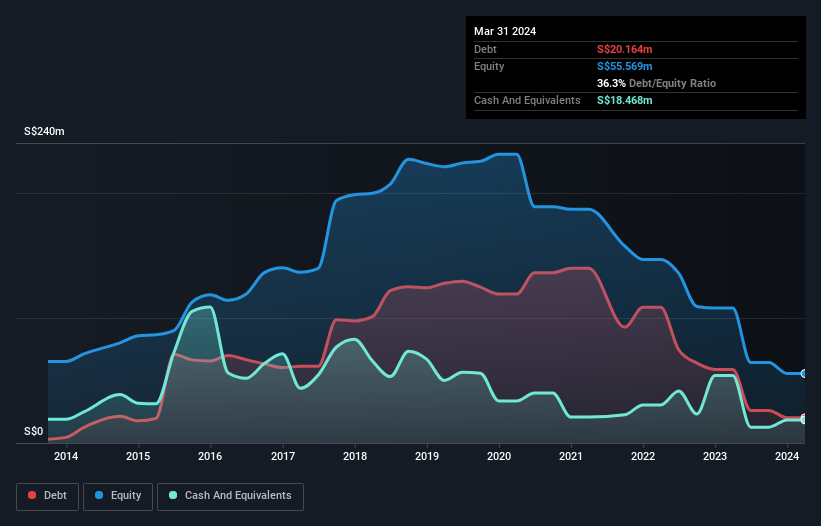- Singapore
- /
- Construction
- /
- SGX:5TT
Keong Hong Holdings (SGX:5TT) Has Debt But No Earnings; Should You Worry?
Warren Buffett famously said, 'Volatility is far from synonymous with risk.' It's only natural to consider a company's balance sheet when you examine how risky it is, since debt is often involved when a business collapses. We can see that Keong Hong Holdings Limited (SGX:5TT) does use debt in its business. But is this debt a concern to shareholders?
When Is Debt Dangerous?
Generally speaking, debt only becomes a real problem when a company can't easily pay it off, either by raising capital or with its own cash flow. If things get really bad, the lenders can take control of the business. However, a more usual (but still expensive) situation is where a company must dilute shareholders at a cheap share price simply to get debt under control. Of course, debt can be an important tool in businesses, particularly capital heavy businesses. When we think about a company's use of debt, we first look at cash and debt together.
See our latest analysis for Keong Hong Holdings
What Is Keong Hong Holdings's Debt?
As you can see below, Keong Hong Holdings had S$20.2m of debt at March 2024, down from S$58.8m a year prior. However, it also had S$18.5m in cash, and so its net debt is S$1.70m.

How Strong Is Keong Hong Holdings' Balance Sheet?
Zooming in on the latest balance sheet data, we can see that Keong Hong Holdings had liabilities of S$97.6m due within 12 months and liabilities of S$22.7m due beyond that. On the other hand, it had cash of S$18.5m and S$74.8m worth of receivables due within a year. So it has liabilities totalling S$27.1m more than its cash and near-term receivables, combined.
Given this deficit is actually higher than the company's market capitalization of S$22.8m, we think shareholders really should watch Keong Hong Holdings's debt levels, like a parent watching their child ride a bike for the first time. In the scenario where the company had to clean up its balance sheet quickly, it seems likely shareholders would suffer extensive dilution. The balance sheet is clearly the area to focus on when you are analysing debt. But you can't view debt in total isolation; since Keong Hong Holdings will need earnings to service that debt. So when considering debt, it's definitely worth looking at the earnings trend. Click here for an interactive snapshot.
In the last year Keong Hong Holdings had a loss before interest and tax, and actually shrunk its revenue by 40%, to S$128m. To be frank that doesn't bode well.
Caveat Emptor
Not only did Keong Hong Holdings's revenue slip over the last twelve months, but it also produced negative earnings before interest and tax (EBIT). Indeed, it lost a very considerable S$34m at the EBIT level. Considering that alongside the liabilities mentioned above make us nervous about the company. It would need to improve its operations quickly for us to be interested in it. Not least because it had negative free cash flow of S$5.3m over the last twelve months. So suffice it to say we consider the stock to be risky. When analysing debt levels, the balance sheet is the obvious place to start. But ultimately, every company can contain risks that exist outside of the balance sheet. We've identified 2 warning signs with Keong Hong Holdings (at least 1 which is a bit unpleasant) , and understanding them should be part of your investment process.
Of course, if you're the type of investor who prefers buying stocks without the burden of debt, then don't hesitate to discover our exclusive list of net cash growth stocks, today.
Valuation is complex, but we're here to simplify it.
Discover if Keong Hong Holdings might be undervalued or overvalued with our detailed analysis, featuring fair value estimates, potential risks, dividends, insider trades, and its financial condition.
Access Free AnalysisHave feedback on this article? Concerned about the content? Get in touch with us directly. Alternatively, email editorial-team (at) simplywallst.com.
This article by Simply Wall St is general in nature. We provide commentary based on historical data and analyst forecasts only using an unbiased methodology and our articles are not intended to be financial advice. It does not constitute a recommendation to buy or sell any stock, and does not take account of your objectives, or your financial situation. We aim to bring you long-term focused analysis driven by fundamental data. Note that our analysis may not factor in the latest price-sensitive company announcements or qualitative material. Simply Wall St has no position in any stocks mentioned.
About SGX:5TT
Keong Hong Holdings
An investment holding company, engages in the building construction, and property and hotel development activities in Singapore and Maldives.
Excellent balance sheet and good value.
Market Insights
Community Narratives



